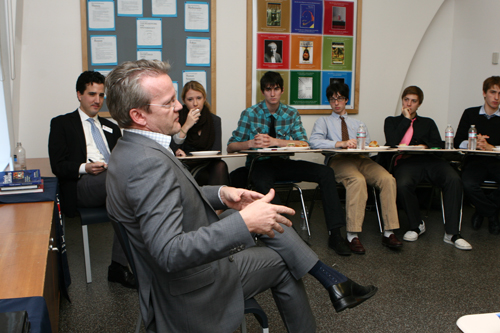
Finnish educator Pasi Sahlberg and Chancellor Stephen Spahn of the Dwight School in Manhattan have big dreams for education. Sahlberg, the celebrated global reformer and author of newly released (and already in reprint) Finnish Lessons: What Can the World Learn from Educational Change in Finland?, spent the day at Spahn’s school in Manhattan.
Sahlberg discussed with faculty and students not just how and why Finland built their phenomenal, world-class education systems, but even more importantly, what needs to be done to maintain its educational excellence as this century progresses.
The Dwight School recently began its own strategic review of how it can build on its success. Famous for its highly integrated global learning community (there are five Dwight campuses, in New York, London, Canada, Beijing, and Seoul; one-third of Dwight’s students originate from another country and represent nearly 40 nationalities; and it sponsors the International Baccalaureate, the only curriculum where students are graded according to international benchmarks), the school’s leadership is nonetheless revisiting the big-picture question of educational vision.
Spahn (the longest standing headmaster of any school in New York city) describes his education vision as “a commitment to ensuring all students reach their full potential by helping them find and pursue their unique ‘sparks of genius.'”
Sahlberg describes his vision in Finnish Lessons as “creating a community of learners that provides the conditions that enable all young people to discover their talent.”
With the technology revolution showing no signs of slowing down in connecting the world on everyone’s iPhone (or other smartphone), how will education remain vibrant for young people? How can educators continue to be strong voices that keep dreams alive in the hearts of future generations? Just like modern educators, modern students won’t have to ration their thinking in terms of villages or towns or cities or even individual nations anymore; modern students will know most of the global issues, thanks to their iPads (or other tablets), before they come to school. Modern students will need to understand the impact of those issues in the context of a global arena. Modern students will be interacting with their global peers more often and hopefully in a more meaningful way. Furthermore, the evolution of technology creates exciting, new opportunities for younger generations. This, too, challenges the education system, because there will be a greater need for young adults to be self-starters than at any time in our history. Helping students identify their passions so that they can begin to realize their own big dreams requires that teachers develop new skills, and this requires educators with keen insight into the strategic issues facing education in today’s world.
How is this reform to be achieved?
Both Pasi Sahlberg and Stephen Spahn believe in personalized learning.
More specifically, Pasi believes in creating a socially inspiring, safe learning community; schools that must be pupil-friendly; schools that must allow more personalized learning paths. Keeping in mind the tremendous changes in learning that will continue to be made possible by the Internet, social networks, and technology, Sahlberg describes his four themes for change in his book as:
- Development of a personal road map for learning for each student.
- Less classroom-based teaching, and more facilitation of students’ collaborative skills.
- Development of interpersonal skills and problem solving.
- Engagement and creativity as pointers of success.
I asked Pasi Sahlberg where things stand in terms of the Big Dream and moving reform forward in Finland.
He explains:
There seems to be two main options. One alternative is the road traveled by many other education systems. This means looking for conventional solutions to the future challenges. In my book, I show how Finnish primary school pupils have significantly less instruction hours compared to American children. In this respect, Finland is also below the OECD averages. One of the main reform items under discussion now is to increase instructional time for primary school pupils. This leads to increasing subjects in an already full list of syllabi in our schools. We are looking at other education systems in terms of setting more prescribed standards and related data systems using national testing and reporting schemes.
The second alternative is a path not walked much by others. It’s about making a bold move to transform our education system from a very strong foundation to be a more personalized, socially inclusive and truly enriching environment that cares about people learning with passion (i.e., the ideas positioned by my four proposals in Finnish Lessons). Finnish authorities are about to agree the next Development Plan for Education and Research for 2012-2016. A bill stipulating time allocation for schools will be passed in 2012. National Framework Curricula for basic School and Upper Secondary School will then be revised. Universities are revisiting their teacher education programs, as well. In other words, all the necessary elements are available to choose this alternative path.
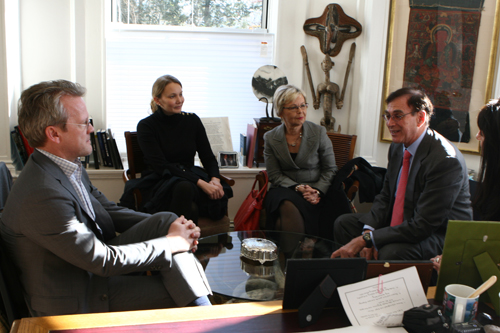
The Aurora Primary School in Expoo (see my post “The Global Search for Education: A Look at a Finnish School“) has been a source of inspiration for Sahlberg in terms of the Big Dream he describes in his book. He believes this model primary school is a socially enriching and caring “home of real learning.” There are other schools working to redesign themselves along the lines of the ideas he discusses in Finnish Lessons.
Sahlberg notes:
Current curriculum requirements, facilities, and increasingly shrinking resources often restrict efforts to renew schools. I find an increasing number of people in Finland and in other Nordic countries being connected to the idea of renewing schools to become places for young people to find their passion. Principals and teachers are disturbed by the lack of jointly agreed vision or dream for the future. Educators are not inspired by national goals that are expressed by numbers or are too rational. Teachers and education leaders want to have a vision of what schools should look like in 2020 or 2030. Most of them think that we should not keep assuming that everything will look the same. Nobody knows how the technology will play out. I see schools as being a place for finding your talent, enriching yourself through being socially attached to one another, and building a healthy personality. At the fork of the road, the key issue for Finns is whether there will be new leadership that will make this possible.
I asked Chancellor Spahn and Dianne Drew, Principal of the Dwight School, to share their themes going forward. They narrowed it down to these four points:
- Each student must learn to identify and solve real-world problems: Schools must provide opportunities that continually connect real-world experiences and challenge traditional modes of teaching and learning. By placing students and teachers in different and challenging circumstances, they acquire the interpersonal and problem-solving skills that are necessary to be lifelong learners.
- Time outside the classroom is life’s laboratory; life in the classroom must set a positive stage for experiences outside the classroom.
- Cultivate a community of open-heartedness and practice the art of creating shared value. Students will desire more than academic success if they are constantly surrounded and challenged by a school environment that they value and that values them. By building confidence, resiliency and respect for all, schools exemplify a community that supports both success and struggle.
- Seek to become self-sufficient and dispel illusions. Students must be encouraged to see beyond the confined boundaries of the textbook, the classroom, the school, and society. Guide students to build skills that prepare them to become self-sufficient and acquire their own understanding of the world. Give teachers the ability to pursue their strengths, passions, and educational ambitions, as well. This will create a dynamic community that supports and inspires one another rather than the traditional formulae of “the teacher teaches and the student is just the sponge.”
Big dreamers never seem to give up. More to follow…
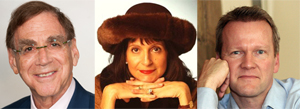
Photos courtesy of The Dwight School and Pasi Sahlberg.
In the Global Search for Education, join me and globally renowned thought leaders, including Sir Michael Barber (U.K.), Dr. Michael Block (U.S.), Dr. Leon Botstein (U.S.), Dr. Linda Darling-Hammond (U.S.), Dr. Madhav Chavan (India), Professor Michael Fullan (Canada), Professor Howard Gardner (U.S.), Professor Yvonne Hellman (The Netherlands), Professor Kristin Helstad (Norway), Jean Hendrickson (U.S.), Professor Rose Hipkins (New Zealand), Professor Cornelia Hoogland (Canada), Mme. Chantal Kaufmann (Belgium), Professor Dominique Lafontaine (Belgium), Professor Hugh Lauder (U.K.), Professor Ben Levin (Canada), Professor Barry McGaw (Australia), Professor R. Natarajan (India), Dr. Denise Pope (U.S.), Sridhar Rajagopalan (India), Dr. Diane Ravitch (U.S.), Sir Ken Robinson (U.K.), Professor Pasi Sahlberg (Finland), Andreas Schleicher (PISA, OECD), Dr. Anthony Seldon, Dr. David Shaffer (U.S.), Dr. Kirsten Sivesind (Norway), Chancellor Stephen Spahn (U.S.), Yves Theze (Lycée Français U.S.), Professor Charles Ungerleider (Canada), Professor Tony Wagner (U.S.), Professor Dylan Wiliam (U.K.), Dr. Mark Wormald (U.K.), Professor Theo Wubbels (The Netherlands), Professor Michael Young (U.K.), and Professor Minxuan Zhang (China) as they explore the big picture education questions that all nations face today. Visit the Global Search for Education community page.
Follow C. M. Rubin on Twitter: www.twitter.com/@cmrubinworld



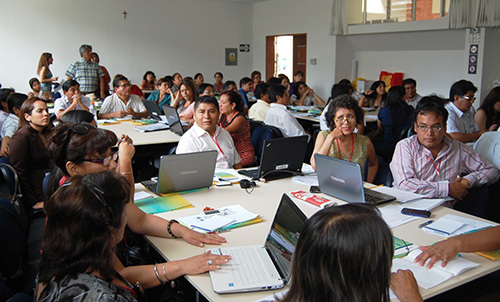
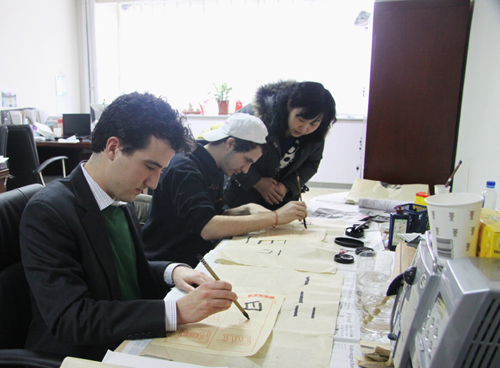
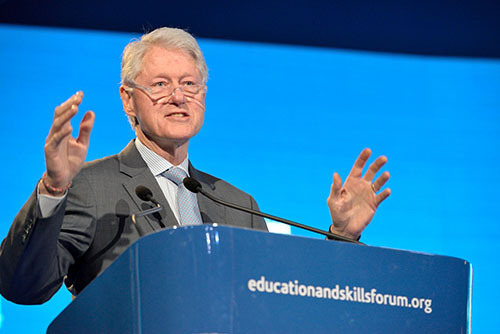
Recent Comments